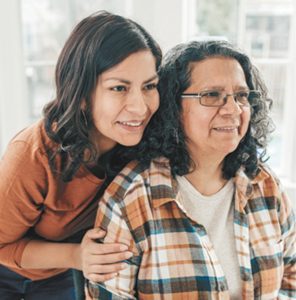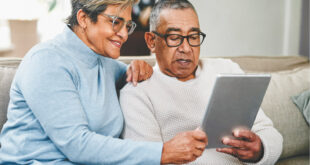 National Caregivers Day is recognized on the third Friday of February each year. It serves as a reminder to express appreciation to the caregivers in our and others’ lives.
National Caregivers Day is recognized on the third Friday of February each year. It serves as a reminder to express appreciation to the caregivers in our and others’ lives.
The Cambridge Dictionary defines a caregiver as someone who takes care of a person who is young, old, ill or disabled. Caregivers are all around us.
There are two main types of caregivers — formal and informal. In 2022, 14.7 million people aged 16 and older were employed in healthcare occupations, according to the U.S. Bureau of Labor Statistics. Registered nurses make up the largest group, numbering 3.4 million. Other familiar titles include medical assistants, physicians, pharmacists and pharmacy technicians, clinical laboratory technologists, nurse practitioners and therapists, among many others. Because these professionals are paid for their services, they would fall under the umbrella of formal caregivers.
AARP reports that millions more — around 38 million Americans — serve as unpaid (informal) caregivers who devote an estimated 36 billion hours of free care annually to parents, spouses, partners, children and friends with severe or disabling health conditions. Their tasks range from hands-on assistance to managing prescriptions and medical claims, scheduling and providing transportation to appointments or friendly companionship. These are often done while juggling their own health needs, family demands and full-time or part-time jobs.
Whether caregiving is someone’s professional job or an unpaid role taken on by a family member or friend, they share a dedication to providing comfort, compassion and companionship.
Florida Cancer Specialists & Research Institute (FCS) recognizes and supports the family members and friends who support their loved ones through their journey as cancer patients. Their critical caregiving role often comes with its own set of burdens and does not go unnoticed.
Caring for the caregivers
Caregivers are deserving of our gratitude as well as our encouragement to take the best care of themselves. For caregivers, caring for oneself is just as important as supporting their loved one. If you are running on empty, you won’t get very far with helping others.
FCS Behavioral Health experts share the following valuable tips to help cancer caregivers cope with the sickness of a loved one and advice for prioritizing self-care and well-being.
Coping with emotions
Caring for someone with cancer can be very demanding. Many caregivers describe it as “like a rollercoaster” at times. It is perfectly normal to feel a range of emotions. Recognizing your feelings is the first step to overcoming difficulty on more challenging days.
Caregivers can benefit by learning coping skills to manage their highs and lows. Suppressing feelings or trying to hide difficult emotions are not helpful coping mechanisms.
Everyone needs an outlet and someone to talk to.
Seek out someone you trust, like a best friend, family member, religious figure or professional, who will allow you to express yourself fully. Group settings, such as organized support groups, can be tremendously powerful as a space to share with and learn from others experiencing similar circumstances. It is also a resource or safe space that can help validate your feelings.
When things get particularly overwhelming, allow yourself compassion and grace. Remembering to take one breath at a time, one moment at a time and one day at a time can help ground caregivers in the present.
Caregivers may frequently put their loved one’s needs over their own. Over time, that can fuel fatigue and resentment and create an overwhelming environment.
Be sure to prioritize personal wellness. Regularly sleeping and eating healthy meals can help caregivers keep their bodies physically strong and equipped. Mental fitness is important, too. Try to make time for a self-care activity, such as:
• Mindful breathing or meditation
• Stretching or exercise (like yoga, walking or others)
• Spending time in nature/outside
• Participating in hobbies
Asking for help
Everyone needs help at some point. However, caregivers may be more likely to avoid asking for help so that they don’t burden others — even if they are carrying the weight of a loved one’s illness. Remind yourself that getting help can also help your loved one because it can allow you to be in a healthier place.
Reach out to another family member, friend or neighbor who can lend time and assistance or share skills you may need or don’t have. It can take a lot of courage to ask for help, but accepting and recognizing these facts is crucial. Other helpful tips:
• Divide tasks among others.
• Be specific about what is needed.
• Accept offers without guilt.
• Know your boundaries.
While National Caregivers Day reminds us of the critical role caregivers play in our lives, every day is a perfect day to show our gratitude and thanks to those who give their time, love and support to the ones they care for.
The most powerful way to let someone know you appreciate them involves two words: “thank you.” And remember to encourage those special people to take time to care for themselves as they do for you.
WORLD-CLASS CANCER TREATMENT, CLOSE TO HOME
About Florida Cancer Specialists & Research Institute, LLC:
(FLCancer.com)
Celebrating its 40th year in 2024, FCS has built a national reputation for excellence that is reflected in exceptional and compassionate patient care, driven by innovative clinical research, cutting-edge technologies and advanced treatments, including targeted therapies, genomic-based treatment and immunotherapy. Our highest values are embodied by our outstanding team of highly trained and dedicated physicians, clinicians and staff.
Florida Cancer Specialists & Research Institute
Boca Raton
21020 State Road 7, Ste 200C
Boca Raton, FL 33428-1320
FLCancer.com/BocaRaton
Delray Beach
5130 West Linton Blvd, Ste B4
Delray Beach, FL 33484-6595
FLCancer.com/DelrayBeach
Lake Worth
4801 S Congress Ave, Ste 400
Palm Springs, FL 33461-4746
FLCancer.com/LakeWorth
Palm Beach Gardens
3401 PGA Blvd, Ste 200
Palm Beach Gardens, FL 33410-2824
FLCancer.com/PalmBeachGardens
Wellington North
1037 S State Road 7, Ste 303
Wellington, FL 33414-6140
West Palm Beach, FL 33401-3406
FLCancer.com/WellingtonNorth
West Palm Beach
1309 N Flagler Dr
West Palm Beach, FL 33401-3406
FLCancer.com/WestPalmBeach
For more information, visit FLCancer.com
 South Florida Health and Wellness Magazine Health and Wellness Articles
South Florida Health and Wellness Magazine Health and Wellness Articles




